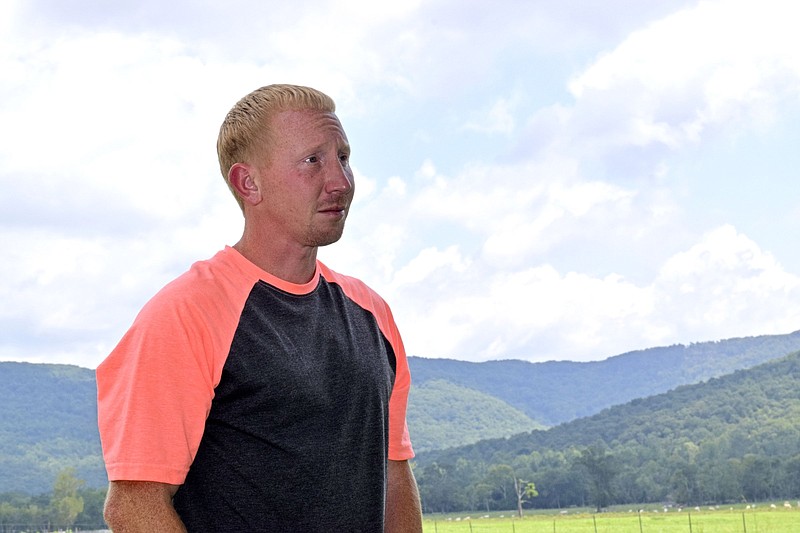The fate of a Grundy County, Tennessee, man's criminal record - cleared last year of murder charges and freeing him after 12 years in prison - now lies with Gov. Bill Lee after a hearing before the state Board of Parole ended Wednesday night with a recommendation for exoneration.
Adam Braseel, 37, was freed last year on a plea to aggravated assault - a best-interest plea also known as an Alford plea in which he maintains his innocence - in return for the dismissal of his 2007 conviction on a murder charge that had put him behind bars for 12 years.
Braseel walked away a free man, but with a felony on his record that he contends was forced and unjust.
The seven-member Executive Clemency Unit panel voted unanimously for exoneration after more than six hours of testimony, questions and discussion, including considerable comments from Braseel himself.
Braseel had been charged with first-degree murder, robbery and aggravated assault in the 2006 beating death of Tracy City resident Malcolm Burrows and the savage attack on his sister, Becky Hill, and her son, Kirk Braden. Hill and Braden have since died.
Wednesday's hearing was held virtually because of the COVID-19 pandemic.
Braseel's attorney, Alex Little, presented witnesses, photos and case files and took up the first four hours or so of the hearing, followed by opposing arguments, testimony and evidence from 12th Judicial District Assistant District Attorney Steve Strain.
The Burrows family also weighed in during the hearing and called for the panel not to recommend Braseel's exoneration. Speaking for the family, Kirby Crabtree told board members the Burrows family has always believed Braseel was the man who committed the crime and assault on Hill and Braden, and that he was justly convicted in 2007.
HOW IT STARTED
On Jan. 7, 2006, the then-22-year-old Braseel was spending a weekend with friends in the Grundy County town of Coalmont. That same night, the 60-year-old Burrows was beaten to death and his sister and nephew savagely attacked by a thin man with red hair who drove away in a gold-colored car.
Braseel was named a suspect the next day based on a photo lineup and a description of the suspect vehicle, both issues that were challenged by the defense in subsequent appeals and highlighted in Wednesday's clemency hearing along with other defense evidence.
The photo "line-up," for instance, only included one suspect for witnesses to consider - Braseel.
In November 2007, Braseel was found guilty by a jury and sentenced to life in prison, largely based only on those two factors, but with no physical evidence tying him to the crime, according to court records.
Since then, Braseel's case has been a tumultuous journey through the legal system.
As he sat in prison for the next decade, Braseel fought through multiple appeals, one producing a favorable ruling by Circuit Court Judge Justin Angel in 2015. Angel overturned Braseel's conviction based on ineffectiveness of counsel and released him from prison. Angel ruled that Braseel's attorney failed to challenge defense issues like the photo line-up.
Less than a year later, the Tennessee Court of Criminal Appeals reversed Angel's ruling, reinstated the convictions and sent Braseel back to prison. The appellate court found that Braseel "failed to prove that he received ineffective assistance of counsel."
It wasn't long before Braseel's battle started going his way.
In 2017, the Tennessee Bureau of Investigation released fingerprint evidence found in Burrows' car at the crime scene in 2006 that for years was never linked to anyone. Braseel filed a petition for a new trial based on the new evidence.
That fingerprint was matched to another Grundy County man, Kermit Bryson, who in 2008 shot and killed Grundy County Deputy Shane Tate, then took his own life in the front yard of a Monteagle home as a manhunt closed in.
In his petition, Braseel contended he and Bryson, a violent man with similar-colored hair and build, resembled each other, the cars they drove at the time were similar and that a wallet was found in Burrows' pocket by an officer who never testified at Braseel's 2007 trial. The state had contended the motive in the crime was robbery because the wallet was said in original trial testimony to be missing.
The hearing held June 26, 2019, on that petition included defense testimony about the new evidence and an account from a former acquaintance of Bryson's that he'd talked to her about Burrows while the two sat talking and getting high in a car on a Grundy County ridge top. She said Bryson talked about how he "had to kill him," referring to Burrows.
After some negotiations when the hearing resumed for expert testimony on Aug. 2, 2019, the defense and prosecution agreed on the best-interest plea that let Braseel walk out of the Grundy County Courthouse a free man.
In pleading guilty to aggravated assault, which is a felony, Braseel faced 3 to 12 years in prison but was released on the prison time he had already served but with a felony conviction on his record.
Braseel feels he was put in a position in which he had no choice but to plead guilty or remain in prison for what could potentially be the balance of a 51-year life sentence.
Contact Ben Benton at bbenton@timesfreepress.com or 423-757-6569. Follow him on Twitter @BenBenton or at www.facebook.com/benbenton1.
